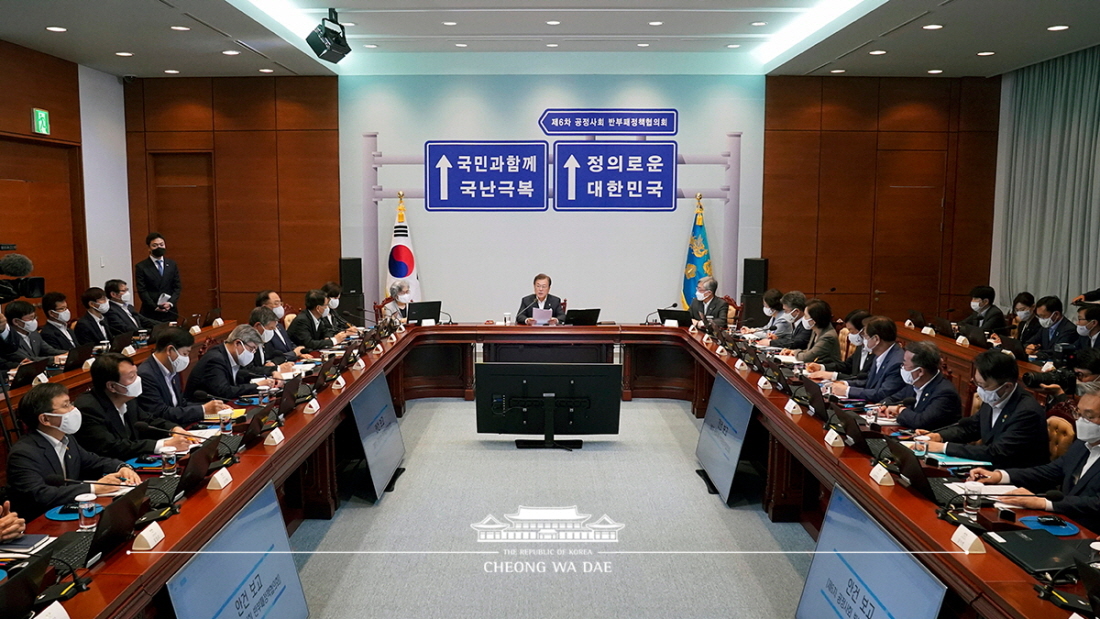이 웹사이트는 제19대 대통령 임기 종료에 따라 대통령기록관이 「대통령기록물 관리에 관한 법률」에 의해 이관받아 서비스하는 대통령기록물입니다. 자료의 열람만 가능하며 수정 · 추가 · 삭제는 불가능합니다.
다만, 「개인정보보호법」에 의하여 개인의 정보를 보호받기 원하시는 분은 관련 내용(요청자, 요청내용, 연락처, 글위치)을 대통령 웹기록물 담당자(044-211-2253)에게 요청해 주시면 신속히 검토하여 조치해 드리겠습니다. 감사합니다.
SPEECHES & REMARKS
BRIEFINGS
Opening Remarks by President Moon Jae-in at 6th Anti-Corruption Policy Consultative Council Meeting for Fair Society

We have convened for this year’s first Anti-Corruption Policy Consultative Council meeting.
In the course of overcoming the COVID-19 outbreak, the people have respected and cared for one another in the belief that neighbors and the Government will be transparent and fair. Rather than complaining about inconvenience, they’ve supported the fairness of the new system that allows face mask purchases on days corresponding to the last digit of birth years. They have also proactively cooperated on efforts to eradicate any attempt to hoard face masks.
We’ve been able to reaffirm that mutual trust based on social transparency and impartiality is the driving force to elicit people’s voluntary participation and cooperation. I’m grateful to everyone for actively handling crimes and corrupt practices perpetrated by those taking advantage of the crisis during the fight to surmount the COVID-19 pandemic.
The Anti-Corruption Policy Consultative Council has done its utmost not only to reform law enforcement agencies but also to root out unfair privileges and deceit as well as unjust practices that are deeply ingrained in people’s daily lives. Consequentially, Korea has seen its rankings significantly rise in the Corruption Perceptions Index by country and the Index of Public Integrity, as measured by international organizations. It earned its highest rankings ever last year. In the Bribery Risk Matrix, Korea ranked 23rd, ten notches higher from the country’s standing before the launch of my Administration. It is very fortunate that our anti-corruption endeavors are being acknowledged internationally.
Such an anti-corruption drive is all the more important in the latter half of the Administration. That’s because governments are prone to lower their guard on their own during this time. We should persist to the end to complete the fair society that people desire.
At today’s meeting, we’ll discuss measures to stop crimes that jeopardize the people’s livelihood, including illegal private financing, voice phishing, cyber gambling and fraud, as well as the new unfair practices emerging in tandem with the digital economy’s growth. I believe these are very timely agenda topics for overcoming COVID-19. Such crimes that imperil people’s livelihoods and those related to speculation can increase during an economic downturn. I urge you to respond strongly from early on.
As socioeconomic changes have accelerated further due to COVID-19, unfair practices in the online platform market and harm to consumers in non-face-to-face transactions are emerging as problems. From the early stage when new economic orders and trading forms take shape, we have to establish fairness and spearhead sound growth.
While sternly responding to crimes and unfair practices, we’ll also have to swiftly put in place an essential institutional foundation. I call upon you to enhance cooperation among related ministries and agencies in these new realms in order to devise countermeasures quickly.
On the same day last week, both the Ministry of Justice and the Supreme Prosecutors’ Office launched taskforces for human rights-based investigations. As law-enforcement agencies have taken actions as the principal actors in their own reform, I hope they will cooperate and devise bold reform measures in line with their resolve to make this the first year for human rights-based investigations so that the people can actually sense change.
We also have to do everything possible to establish follow-up measures for the establishment of an agency to investigate corruption involving high-level officials and for the readjustment of investigative authority between prosecutors and the police. Most of all, I ask for cooperation from the National Assembly so that the new agency can be launched next month as stipulated in the law.
The Government’s capabilities should be concentrated more extensively on anti-corruption policy than any other area. This is because integrity and fairness must be improved simultaneously and comprehensively in all parts of our society. Only when we alter all of the customary practices that are susceptible to corruption and inequality will social capital – so-called trust – accumulate and we be able to stand as a nation that leads the post-COVID-19 era.
I also ask you to do your utmost to create an environment where public servants can actively carry out their duties, so we can lead the post-COVID-19 era. For instance, we should encourage them to show initiative in carrying out their administrative duties and exempt them from the ensuing responsibilities.
Anti-corruption reform is a task that we must ceaselessly push in order to increase transparency and fairness and achieve social unity. I urge the Anti-Corruption Policy Consultative Council for Fair Society to play the central role and do all that it can with strong determination until the end of my Administration.



